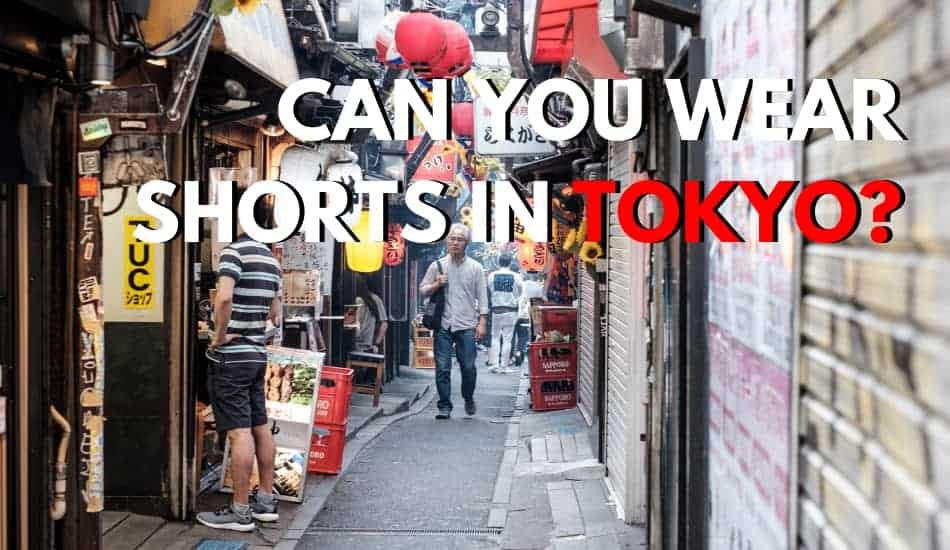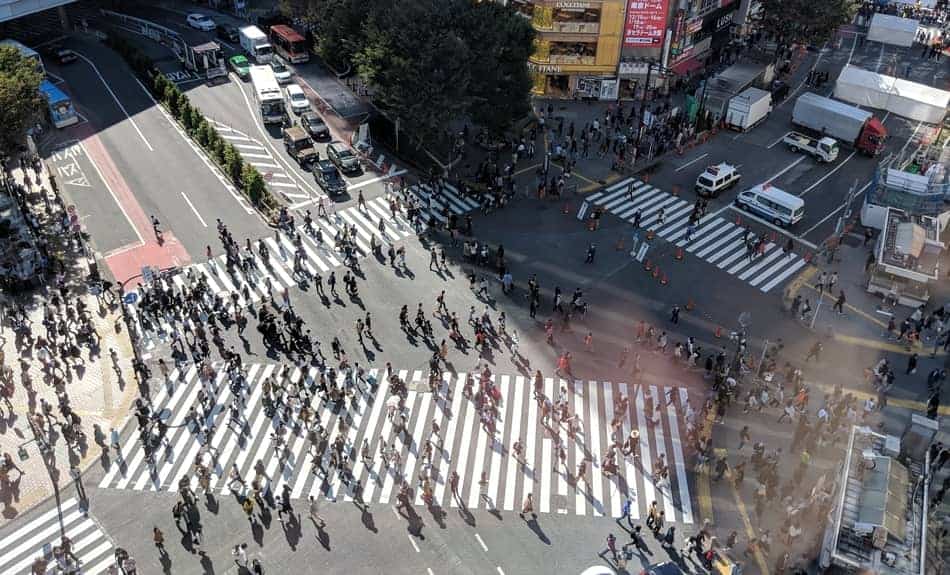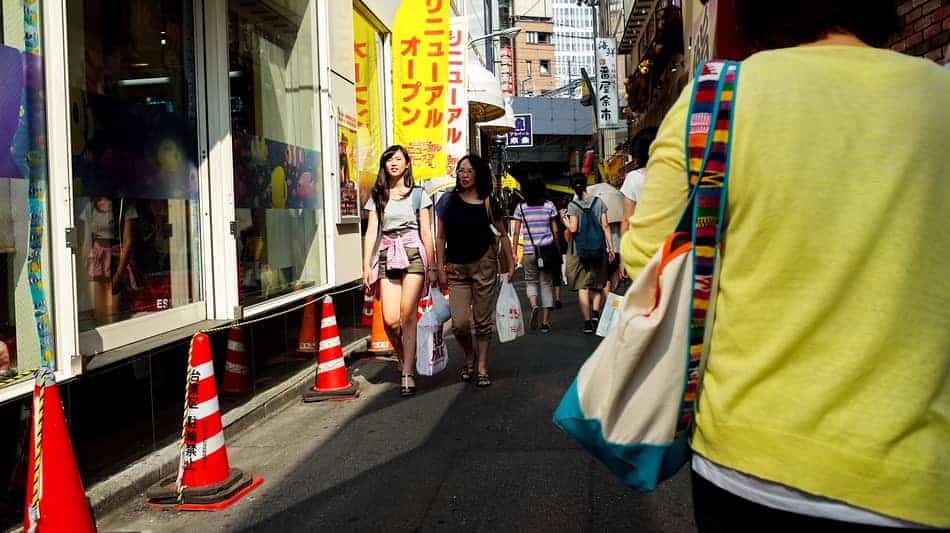Deprecated: mb_convert_encoding(): Handling HTML entities via mbstring is deprecated; use htmlspecialchars, htmlentities, or mb_encode_numericentity/mb_decode_numericentity instead in /home2/thetoky7/public_html/wp-content/themes/acabado/functions.php on line 2119

Tokyo temperatures on average are 80+ degrees Fahrenheit in the summertime. It’s not uncommon for the thermostat to hit 90 degrees after the rainy season ends in June. In these sticky summer temps, you’ll want to wear shorts, but can you?
Yes, you can wear shorts in Tokyo in the summertime. Most summer attire is permitted on the city streets. Just keep in mind that among businesspeople dressed professionally, you might stand out.
Are there certain areas where shorts aren’t permitted, such as temples? What about other summer gear like sleeveless shirts and crop tops? If you’re curious about appropriate summer attire in Tokyo, this is the article for you.
DO NOT SKIP THIS ARTICLE: 15 Awesome things Japan is known for!
Can You Wear Shorts…
On the Streets of Tokyo?
As I mentioned in the intro, you should be fine wearing shorts as you walk around Tokyo. This goes for both men and women.
Speaking of women’s dress code, there’s pretty much no limit on shorts length. When it comes to Japan, it’s better to be covered up on top (which I’ll explain in more detail later) than on the bottom. Still, to be on the safe side, you might want to leave the booty shorts at home and wear something functional yet fashionable instead.
You may even see some Japanese residents wearing summer gear if the weather is hot enough. This may happen more on the weekend. During the week, most residents who are going to and from work will wear professional attire like suits despite the heat. In that regard, things aren’t too different from how they are back home in the United States.
For the most part, though, Japanese people tend to dress warmer than what the weather calls for. It may be hot to you, but residents may be wearing cooler-weather clothes like long-sleeved shirts and pants.
In a Temple or Shrine?
If you’re in Tokyo for a visit, then surely you have at least a couple of temples or shrines on your itinerary. What do you wear when you see these places? And by the way, if you’re not sure what to do, check out this kick-ass 3-day itinerary!
While there’s no hard and fast rule, you generally want to dress more conservatively than you would if you were strolling the streets of Tokyo. It’s just the respectful thing to do. If you’re a woman, perhaps you wear a long dress that day rather than shorts. You could also bring a cardigan to cover your arms. As a male, you could wear short sleeves and pants and again, bring a jacket.
You don’t want to accidentally disrespect anyone, so err on the side of caution if a shrine or temple is part of your plans for the day. You can always dress one way and then go back to your hotel and get changed into more summery attire after your visit.
In a Restaurant?
There’s no need to stress too much about what to wear as you sample Tokyo’s varied, incredible cuisine. You would almost never be turned away at a restaurant for what you’re wearing, as long as you have a shirt and shoes on and you’re not showing large swathes of skin.
If it’s a casual restaurant, you can stroll in wearing whatever you have on for the day. Just like you would at an American establishment, if you’re dining at a nice restaurant, you might want to put on more formal attire. This isn’t mandatory, though. You would feel underdressed, but you’ll survive.

In a Museum?
Like you would in a temple, it’s better to be more cautious about what you’re wearing if you’re visiting a museum. While you’re not always necessarily going in a temple or shrine, that’s not the case with a museum. You will be inside checking out artwork, exhibits, and the like. Dress for the occasion.
That said, if you can wear a professional sleeveless dress or a lightweight button-down shirt, that would be best. Not all museums in Japan have air conditioning. You could end up feeling sweatier and hotter inside than you do outside because all the humidity gets trapped in the building.
If the museum you’re visiting does have running AC, then longer sleeves are best. Also, definitely take a moment to appreciate the cold air, because you won’t find it everywhere.
In an Observatory?
Observatories or observation decks may look like fancy buildings, but inside, many of them host a wealth of entertainment options. You could eat at a café or restaurant or even enjoy arcade games and rides at the Sky Circus Sunshine observation deck. And remember, no matter how hot it is, do not forget to visit the world’s tallest tower; Tokyo Skytree.
For those reasons, you’re free to dress for the weather when you’re visiting an observatory. Again, air conditioning isn’t guaranteed, so you want to be comfortable above all else. Just make sure it’s appropriate.
In a Café?
Like a restaurant, there’s no strict dress code for a café. These spots can attract all types: tourists who want a drink, businesspeople who need a break, even gamers at an arcade café. What you’re already wearing for the day ought to suffice, but always make sure you have on a shirt and shoes at least (and pants, too, but you knew that).
Can You Wear Tanks or Crop Tops in Tokyo?
Okay, now that I’ve covered what you can wear on your bottom half, what about up top? Are tank tops or crop tops permitted in Tokyo?
Tank tops are allowed in Tokyo for both men and women. While the locals aren’t likely to dress this way, at least not without layers, you can. This includes spaghetti-strapped tops for women. If you’re aware of the myth that you cannot display your shoulders when visiting Japan, know this is just a myth. Showing shoulders is fine.
If you’re a woman and you’re wearing sleeveless tops, you might want to make sure your bra straps don’t show. Again, it’s best to look put-together and not too revealing when visiting a new place.
As for crop tops, you’ll have to use your own judgment. Women are supposed to be conservative with cleavage in Japan, in that showing even a hint is often not regarded as appropriate. If you have a low-cut crop top or one that could reveal your bra from underneath, it’s best to leave it at home. In fact, for all the shirts and dresses you bring, make sure they have a higher neckline. If the neckline goes even a few inches beneath your collarbone, have another shirt you can layer underneath.
If you want to wear a short-sleeved crop top with high-waisted shorts or a skirt, that should be fine. While you should avoid flaunting too much torso skin, when it comes to your upper half as a woman, avoiding showing any cleavage is more important.

Which Footwear Is Most Appropriate in Summer?
You’ll see all sorts of footwear in Tokyo, from professional business shoes to open-toed wedges (for women) and even sneakers as casualwear.
You do want your shoes to match your outfit, yes, but above all else, your comfort is key. Don’t squeeze your feet into a pair of heels or dress shoes just to look trendy. Your feet are going to hurt in 15 minutes. Blisters make it hard to walk, and you’ll be on your feet for much of your Tokyo adventures.
Perhaps buy shoes ahead of your trip and break them in well so by the time you get to Japan, the shoes don’t hurt. You could even bring an old favorite pair of shoes, as long as they’re not so worn in they don’t support your feet anymore.
You may visit Tokyo annually or just once in a blue moon. Either way, you do not want to waste a single day in this incredible city down and out with sore, blistered feet. If you’re most comfortable in wedges, then wear those! If it’s sneakers or even hiking boots, then go for it.
Here’s a note on flip-flops: they don’t have the best reputation in Japan. Sandals are a-okay, but plain ol’ flip-flops are not. Save the flip-flops for the beach days back in the US and invest in a sturdy pair of sandals if you need to ventilate your feet.
I would recommend you bring at least two pairs of shoes with you for your trip to Tokyo. One of these should be your everyday walking shoes and the other pair a nice pair of formal shoes. You can wear these when you go to a museum or an expensive restaurant.
Conclusion
If you’re visiting Tokyo in the heat of summer, you can wear shorts without offending the locals. When it comes to what you wear up top, it varies. Sleeveless shirts are fine, but women showing cleavage is not. Flip-flops are another Tokyo faux-pas that’s better off left at home.
While you can wear pretty much anything you want (within reason) wherever you go in Tokyo, use your head. If it’s a nicer building or establishment, cover up a little bit. Wear layers so you can take them off on the hot streets and then put them back on in a museum or temple. Good luck!
Questions? Post a comment down below!

